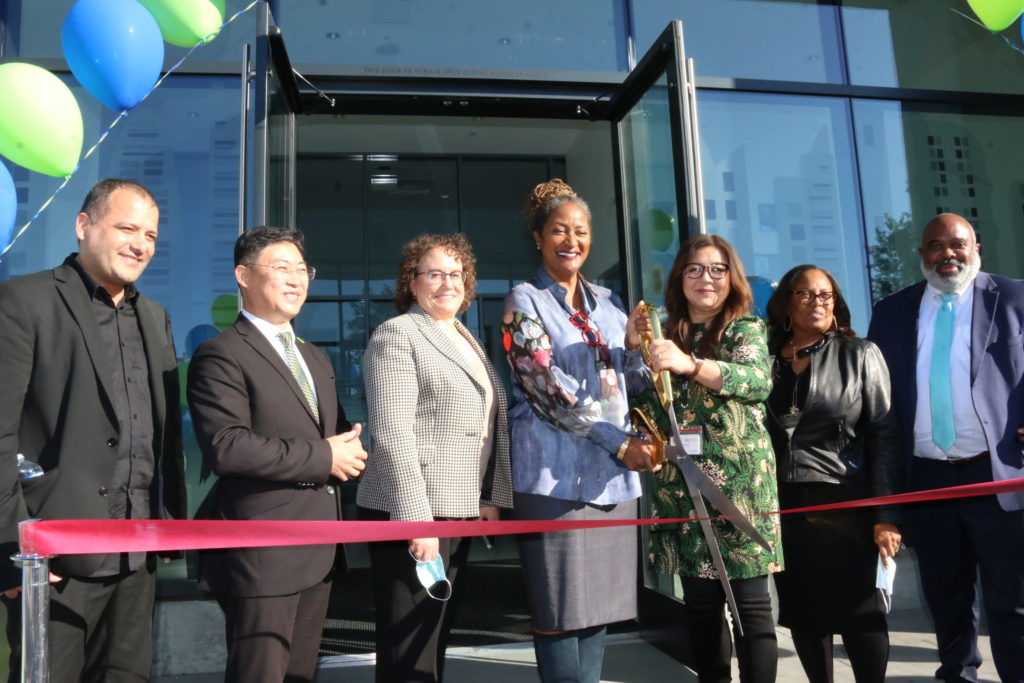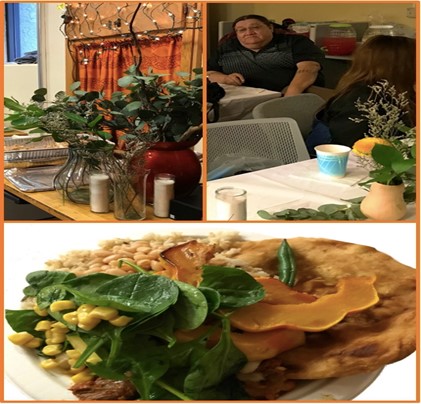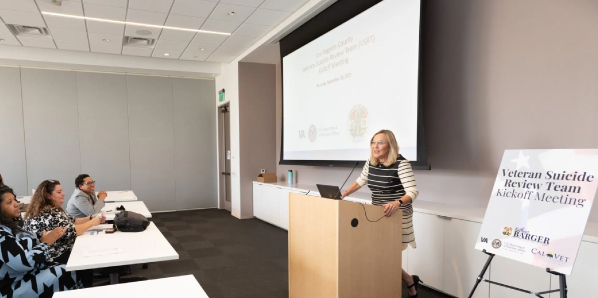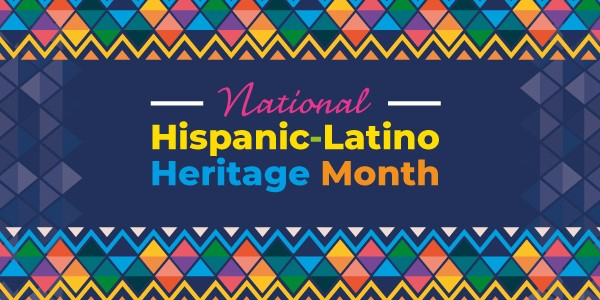The LACDMH 2023 Cultural Competence Plan Report
By Sandra T. Chang, Ph.D., Cultural Competency Unit Program Manager
The ARDI Division – Cultural Competency Unit (CCU) is celebrating its completion of the annual 2023 Cultural Competence Plan Report, which is based on the Cultural Competence Plan Requirements (CCPR) set forth by the California Department of Health Care Services (DHCS). The report is a systemwide narrative that features the remarkable work by LACDMH programs to serve L.A. County communities with culturally and linguistically mindful, inclusive, equitable, and relevant approaches. For 2023, the CCU interacted with over 60 departmental sources of information inclusive of administrative and clinical programs. All these efforts culminated in comprehensive and informative report, which was praised during the 2023 External Quality Review Organization (EQRO) system review during the week October 16th.
The 460-page report is organized in the following eight areas of required content:
- Criterion (CR)1: Overview of LACDMH’s commitment to cultural, linguistic and equitable service delivery
- CR 2: Data, assessment, and analysis of service delivery by race/ ethnicity, gender identity, age group, language, Service Area, Medi-Cal and 133% Federal Poverty Level and three MHSA components
- CR 3: Strategies to reducing racial/ethnic, cultural and linguistic disparities
- CR 4: Demographics, goals and activities of the LACDMH Cultural
Competency Committee
- CR5: Cultural competence-related trainings available to the workforce
- CR 6: Efforts to develop a culturally and linguistically diverse workforce
- CR 7: Linguistic capacity of the system
- CR 8: Adaptation of services to serve the community in innovative ways
It is my professional joy and pride as the CCU’s program manager to publicly recognize and praise the staff who made this monumental endeavor possible:
- Hyun Lee, Clinical Psychologist II
- Guadalupe Aguilar, Intermediate Typist Clerk
- Christine De La Cruz, Mental Health Services Coordinator II
Their steadfast commitment, dedication, and relentless teamwork provided a strong foundation for the long journey leading to the successful completion of the report. A special acknowledgment is given to Dr. Hyun Lee for her multiple contributions throughout the process of report development. Additionally, other members of the CCU and the ARDI Division provided invaluable support by submitting content in their areas of expertise and serving as internal reviewers of the report at the time it was in draft form. Special thankfulness and appreciation are expressed to Dr. Rebecca Gitlin, Dr. Luis Guzman, Dr. Anna Yaralyan, Mr. Julio Celada, Ms. Regina Ramirez, Ms. Kelly Wilkerson, and Ms. Adriana Carrillo. Additionally, the team effort leading to the 2023 Cultural Competence Plan Report completion included the remarkable support received from the Prevention Bureau – ARDI Division management as well as members of the executive management team. The CCU is particularly grateful to Ms. Connie Draxler – Acting Chief Deputy Director, Ms. Mary Barraza – Senior Deputy for Prevention and Child Wellbeing Administration, Dr. Robert Byrd – Prevention Bureau Deputy Director and Ms. Mirtala Parada Ward – ARDI Division Program Manager III.
Together, the ARDI Division – CCU acknowledges and extends its gratefulness to all programs who provided key information for inclusion in the 2023 Cultural Competence Plan Report. These key programs exemplify the collective impact of day-to-day departmental operations in service of Los Angeles County’s culturally and linguistically diverse communities. We take the opportunity to honor them for their invaluable contributions. In the words of the famous philosopher Voltaire, “Appreciation is a wonderful thing: it makes what is excellent in others belong to us as well.” Thank you all for sharing your subject matter expertise, time, and quality reporting leading to the comprehensive systemwide report.
- Administrative Services Division
- Assisted Outpatient Treatment Program (AOT)
- CalWORKs (California Work Opportunity and Responsibility for Kids) and General Relief Opportunities for Work (GROW) Programs
- Chief Information Office Bureau (CIOB)
- Application Development Team
- VSEE
- Child Welfare Division
- Crisis Residential Treatment Program
- DMH/DHS Collaboration Program
- Emergency Outreach and Triage Division
- Law Enforcement Teams
- Psychiatric Mobile Response Team (PMRT) and Therapeutic Transport Team (TTT)
- School Threat Assessment Response Team (START) Program
- Enriched Residential Care Program
- Faith-Based Advocacy Council
- Full Service Partnership
- Geriatric Evaluation Networks Encompassing Services Intervention Support (GENESIS) Program
- Help Line-ACCESS Center
- Homeless Outreach Mobile Engagement (HOME) Program
- Housing and Job Development Division
- Housing and Supportive Services Program
- Human Resources Bureau (HRB)
- Linkage Programs
- Maternal Mental Health
- Men’s Community Re-Entry Program
- MHSA Administration and Oversight Division
- Outpatient Services Division
- Transition Age Drop-In Centers
- Wellness Outreach Workers (WOW)
- Prevention and Early Intervention (Older Adults) – Anti-Stigma and Discrimination Team
- Older Adult Service Extenders
- Patient’s Rights Office
- Peer Run Centers
- Prevent Homelessness and Promote Health
- Prevention Bureau
- Anti-Racism, Diversity and Inclusion (ARDI) Division
- Community Ambassador Network
- Cultural Competency Committee (CCC)
- Cultural Competency Unit (CCU)
- Health Neighborhoods
- Language Assistance Services Team
- LBGTQIA2-Clinical Consultation Team/Champion Network
- My Health Los Angeles (MHLA)
- Promotores de Salud & United Mental Health Promoters Programs
- School-based Community Access Point
- Spanish Support Groups
- Speakers Bureau
- Underserved Cultural Communities (UsCC) Unit and Subcommittees
- Public Information Office (PIO)
- Quality Assurance (QA) Division
- Quality, Outcomes and Training Division (QOTD)
- Quality Improvement (QI) Unit
- Training Unit
- Stakeholder Process
- Community Leadership Team (CLT)
- Telemental Health Program
- Transition Age Navigation Team
- Transition Age Youth Drop-In Centers (TAY)
- Urgent Care Centers
- Veteran Peer Access Network (VPAN)
- Women’s Community Re-Entry Program
The 2023 Cultural Competence Plan report will soon be accessible at the Cultural Competence Unit’s web page: Cultural Competency Unit – Department of Mental Health (lacounty.gov)
National Hispanic Heritage Month
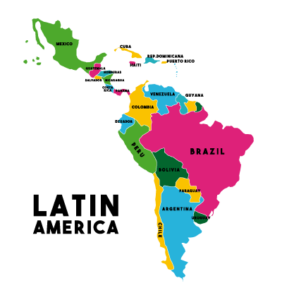 Each year, Americans observe National Hispanic Heritage Month from September 15 to October 15, by celebrating the histories, cultures and contributions of American citizens whose ancestors came from Spain, Mexico, the Caribbean and Central and South America.
Each year, Americans observe National Hispanic Heritage Month from September 15 to October 15, by celebrating the histories, cultures and contributions of American citizens whose ancestors came from Spain, Mexico, the Caribbean and Central and South America.
The observation started in 1968 as Hispanic Heritage Week under President Lyndon Johnson and was expanded by President Ronald Reagan in 1988 to cover a 30-day period starting on September 15 and ending on October 15. It was enacted into law on August 17, 1988, on the approval of Public Law 100-402.
The day of September 15 is significant because it is the anniversary of independence for Latin American countries Costa Rica, El Salvador, Guatemala, Honduras and Nicaragua. In addition, Mexico and Chile celebrate their independence days on September 16 and September 18, respectively. Also, Indigenous Peoples’ Day (October 11) falls within this 30 day period.
Below is a compilation of on-line articles that highlight interesting facts about Independence Day festivities in the countries mentioned above, courtesy of the Prevention Bureau’s Anti-Racism, Diversity and Inclusion (ARDI) Division – Cultural Competency Unit:
LACDMH Opens Doors to Directly Operated Koreatown Mental Health Center
On Dec. 7, LACDMH hosted a ribbon-cutting event to celebrate the grand opening of its Koreatown Mental Health Center (MHC), which is located on the ground floor of the department headquarters building and adjacent to its Peer Resource Center.
The ceremony included remarks from L.A. County’s 2nd District Supervisor Holly J. Mitchell, LACDMH Interim Director Dr. Lisa H. Wong, and SALT 4 Co-Chairs Esiquio Reyes and Pastor Seung Nah. After the remarks and ribbon-cutting, attendees took group tours of the new facility, where they met with the clinic’s staff and learn about the well-being services offered.
At the ceremony, Dr. Wong said that “this clinic has been in the works for a very long time, and it’s a welcomed and needed resource in the community. We heard firsthand from the community how much culturally and linguistically-sensitive mental health services were needed in this area, where Koreans and Korean Americans make up roughly 50 percent of the population. The new Koreatown clinic will allow us to better address the specific needs of this community.”
Thanksgiving from the Lived Experience of an Indian
by Sunnie Whipple, former co-chair of the LACDMH Cultural Competency Committee (2018-2021)
Have you ever wondered?
- A turkey’s head is bald without feathers, so why don’t we call it a “Bald Turkey;” compared to an eagle whose head is covered with feathers, that gets called a “Bald Eagle?” This makes no sense.
- Everyone is thankful, except the turkey who gets eaten. So, thankfulness is dependent on whose stomach gets filled—although the turkey’s stomach gets filled with stuffing, so it can’t be thankful cause it’s dead.
- My grandson is part of a new generation getting his culture instilled in him through ceremonies like name-giving at the Sundance, or sitting with a drum group at powwows, which is consistent with his love for the turkey drumstick.
- Why are we not more thankful to the Creator for providing? We often just think about the food.
- Indians who celebrated Thanksgiving…I’m one of them, but not necessarily like others think. And I don’t mind being called “an Indian.” I’ve been called an Indian all my life. I don’t mind celebrating Thanksgiving either. The food is good and so is getting together with family and friends.
So How did I celebrate Thanksgiving at home as a boy? Let me tell you.
As a boy, Thanksgiving wasn’t a big celebration. The attitude of the dominant culture was primarily negative toward us Native Americans (still called Indians back then), and we were more interested in keeping our family and community alive. In an era where reservation settlement, forced relocation, assimilation efforts, termination goals, and everything was “cowboys versus Indians,” (and the Indians usually lost), there wasn’t that much to be thankful for other than the presence of family and a deeper understanding that the Creator was still looking out for us. We never had a problem being thankful to God. We were thankful to survive the oppressions we faced and for having each other. There weren’t that many jobs on the reservation so the economy was bad and most families had to depend on food commodities. Along with an introduction to alcohol, which affected the well-being of many families, we went from being independent hunters and gathers, to being dependent on the federal government. So, we just didn’t get very connected with the history or the celebration of Thanksgiving.
Remembering Sunnie Whipple
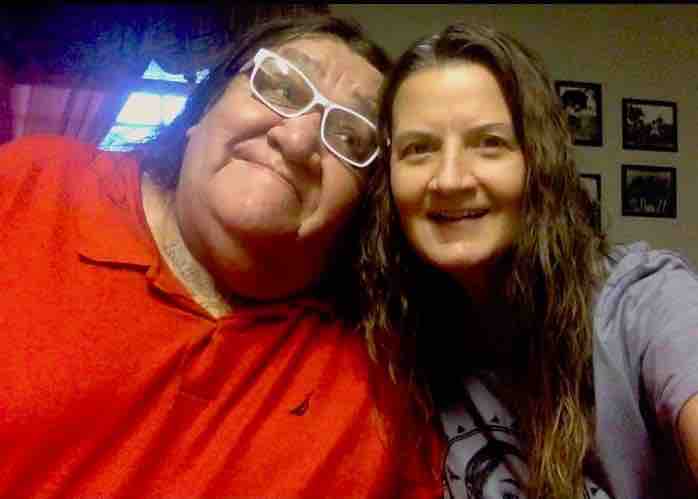
Sunnie Whipple (left) with Bernice Mascher (Source)
By Bernice Mascher, LACDMH Cultural Competency Committee Co-Chair
Two days before Thanksgiving on November 21st, 2021, Sunnie Whipple crossed over to join his ancestors. Two thoughts crossed my mind.
- First, he would miss out on all the Native American community feasts and get-togethers. He always looked forward to this. However, he was now experiencing a new level of health and thankfulness and fellowship.
- My next thought was how much he would be missed here. In the midst of loss, I felt a profound sense of thankfulness to know him, and for the many opportunities to team up with him on outings, events and projects. I will forever miss that.
Sunnie really enjoyed learning new things, engaging with other people, and finding ways to bring about good change. In all these opportunities, he was very proactive in presenting the Native American culture of today in a more realistic and positive light. In many ways, that was also what Thanksgiving was for him, as he enjoyed the get-togethers, the food, and the conversations around the table, including what he thought about the holiday. There were various events and feasts he often attended in the surrounding Los Angeles area, as well as in neighboring counties, as many Native American organizations and churches pulled together community members to gather and enjoy food and fellowship during this holiday.
LACDMH and Partners Join Forces to Form Veteran Suicide Review Team
by H. Chung So, Public Information Officer
L.A. County’s Veteran Suicide Review Team (VSRT) officially kicked off with its first meeting yesterday at LACDMH’s headquarters, beginning a collaborative and data-informed process to analyze veteran suicides and look for opportunities to prevent additional suicides in the veteran community.
The partnership included staff and resources from multiple County departments, including co-chair departments LACDMH, Medical Examiner/Coroner, Public Health, as well as additional representatives from Military and Veterans Affairs, local, state, federal, and private agencies. Together, they will systematically examine veteran suicide, with a focus on identifying service gaps or unmet needs so that resources can be enhanced to better support veterans’ well-being.
VSRT’s creation was introduced as a board motion by L.A. County Supervisors Kathryn Barger, and it was unanimously approved by the Board of Supervisors. LACDMH is the lead administrative agency for VSRT during its one-year pilot phase.
La Tina Jackson, Deputy Director of LACDMH’s Countywide Engagement Division, spoke about the need to address suicide in the veteran community. “The unfortunate reality is that veterans die by suicide at four times more than the national average,” said Ms. Jackson. “They have a 57 percent higher risk for death by suicide than those who have not served. This is the disproportionate but preventable burden that each of us gathered here today has made a commitment to course correct. It is that commitment, that promise to our veterans and their families that we commence and commemorate today.”
National Recovery Month: Locked Up from Employment
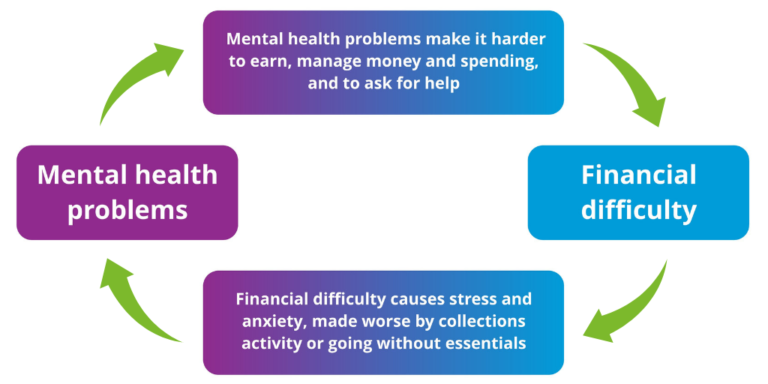
The cycle of mental health stressors and financial burden; image courtesy of Money and Mental Health Policy Institute
by Johana Lozano, Cultural Competency Committee Co-Chair
Finding work is an overwhelming task for anyone. However, it is a distressful journey for individuals who have a behavioral condition and a history of incarceration. Discrimination, stigma, and mental illness caused from being in a correctional institution all contribute to low hiring rates. As a peer specialist at the Peer Resource Center, Laura Kerr uses her lived experience to help citizens of Los Angeles County find meaningful employment. Her group, entitled “Work Readiness,” is more than just a handout. This support group provides career pathways, guidance, and training to improve upon basic job serving skills, understand employer expectations, and learn life skills needed for self-sufficiency.
“There is such a thing as work etiquette that we often don’t know about,” said Kerr.
As part of National Recovery Month, she wanted to emphasize the importance of learning how to earn, manage, and spend money when people have a history of imprisonment. A former participant of her group who is now fully employed at an esteemed entertainment company spoke highly of his experience.
“The group provided a great support system that kept me engaged and accountable. They genuinely cared and knew what I was going though. She checked in to see why I had stopped coming to the group. That was really helpful,” the participant, who wanted to remain anonymous, said. Within one year on the job, the participant was promoted twice and received a bonus at work.
If you would like to learn more about this gathering or want to participate, please contact Laura Kerr at LKerr@dmh.lacounty.gov
Information about the group is listed below:
WORK READINESS GROUP
1 to 3 p.m. on 1st and 3rd Thursdays of the Month (audio only)
+1 323-776-6996
Conference ID: 612 716 535#
Celebrating National Hispanic-Latino Heritage Month
National Hispanic-Latino Heritage Month, which takes place from September 15 to October 15, celebrates the cultures and achievements of Hispanic-Latino American communities in the United States. For the Department of Mental Health, this month is also an opportunity to focus on this population’s specific well-being needs, especially in identifying and reducing their unique barriers to accessing mental health care. Current and ongoing efforts to address this need include:
- Around-the-clock availability of Spanish-speaking staff at our 24/7 Help Line, as well as access to third-party services who can translate/interpret additional Latin American languages;
- Engagement with our stakeholders during program development, implementation, and evaluation, particularly through the Latino Underserved Cultural Communities (UsCC) group;
- Our United Mental Health Promoters program, which educates Hispanic-Latino communities about mental health issues, stigma reduction, and available supports through LACDMH and its partners;
- Engagement with Spanish language media and Hispanic-Latino community groups – including schools and faith-based organizations – through our Speakers Bureau, where our experts share timely information and tips on mental health and well-being;
- Trainings and consultations with our staff to enhance their cultural competency when working with Hispanic-Latino clients and their loved ones;
- Collaborations with other government agencies, private sector partners, and community- and faith-based organizations to further our outreach efforts to the Hispanic-Latino community.
We look forward to building upon these programs to better meet the mental health needs of L.A. County’s Hispanic-Latino communities. If you would like to get involved, please contact Dr. Luis Guzman, liaison to our Latino UsCC, at LGGuzman@dmh.lacounty.gov.
You can also learn more about National Hispanic-Latino Heritage Month, and the Latin American countries that celebrate their Independence Days during this period, on our Cultural Traditions and Connections blog.
Waiting List for Section 8 Housing Choice Voucher Program Opening Soon
Individuals and families who are interested in participating in Section 8 housing program will soon be able to put their names on the waiting list. This housing choice voucher program aids low-income families to be able to afford decent, safe, and sanitary housing. The Housing Authority of the City of Los Angeles (HACLA) will open the waiting list lottery for Section 8 between Oct. 17 to Oct. 30 and interested individuals may apply online through HACLA’s website.
In accordance with U.S. Department of Housing and Urban Development regulations, HACLA must maintain a waiting list for the Section 8 program, and the current list – which was last opened in 2017 – will be exhausted soon.
In preparation for the application’s launch on Oct. 17, HACLA is working with partner agencies and organizations to increase awareness of the HACLA’s application period and process, ensure equitable application access, and support individuals who face barriers with online applications. For more information, refer to HACLA’s announcement letter and fact sheet (English/Spanish) about the waiting list lottery opening, and additional materials will be published on HACLA’s website in early October.
Program Highlight: Los Angeles Suicide Prevention Network
Suicide Prevention PSA English from Los Angeles County Newsroom on Vimeo.
Launched in 2010 to meet the growing need for suicide prevention and crisis intervention resources, the Los Angeles Suicide Prevention Network (LASPN) is a joint effort between LACDMH and its numerous partners who are collectively focused on decreasing the number of suicide deaths and attempts in L.A. County and beyond.
Together, LASPN works to engage communities, raise awareness of mental health issues and resources, coordinate professional and layperson training, and share evidence-based best practices for suicide prevention, intervention, and “postvention” (which supports those who survived a suicide attempt and those who have lost a loved one to suicide).
According to Tracie Andrews, LACDMH’s Mental Health Clinical Supervisor and Co-Chair of LASPN, the network’s formation was an organic process.
“Our department was already providing training, support, and linkage services through the MHSA-funded Partners in Suicide Prevention Program (PSP), and we discovered a wealth of experts and resources in the community as well as a broad range of unmet demand, so we formed LASPN as a way to bring all of our partners to the table and work together to prevent suicides in the County.” read more…

